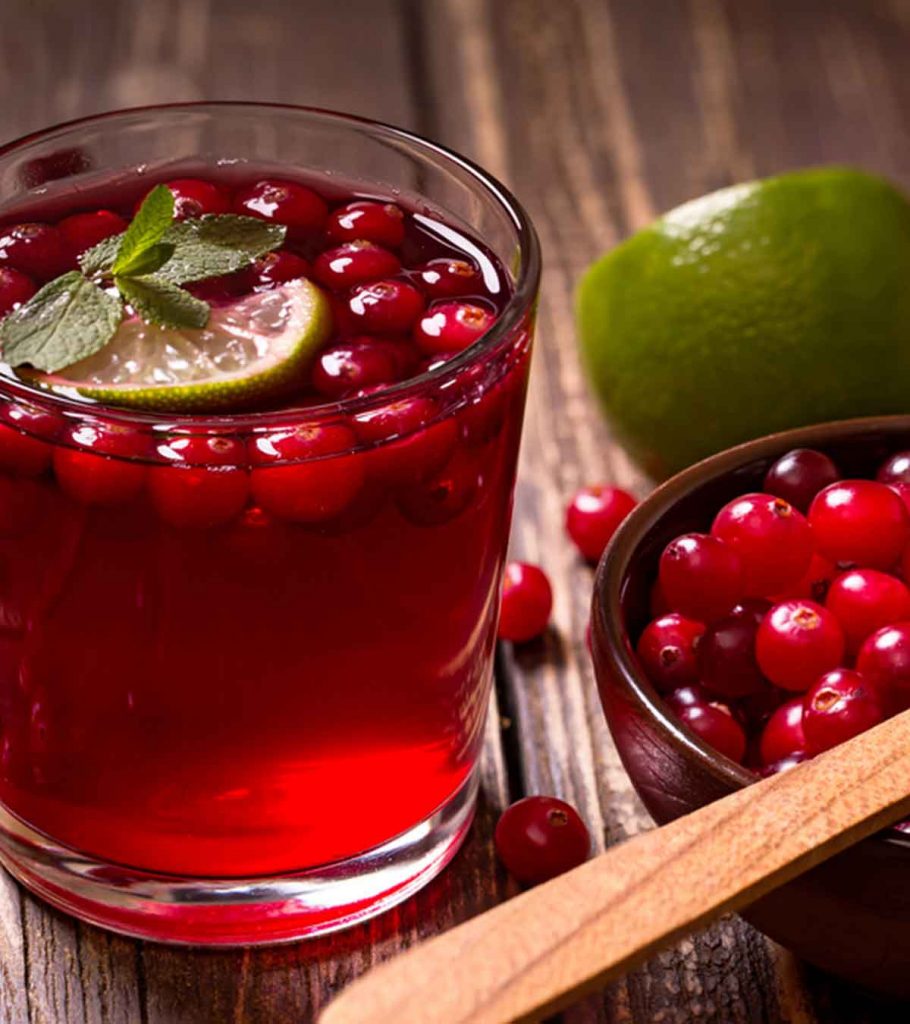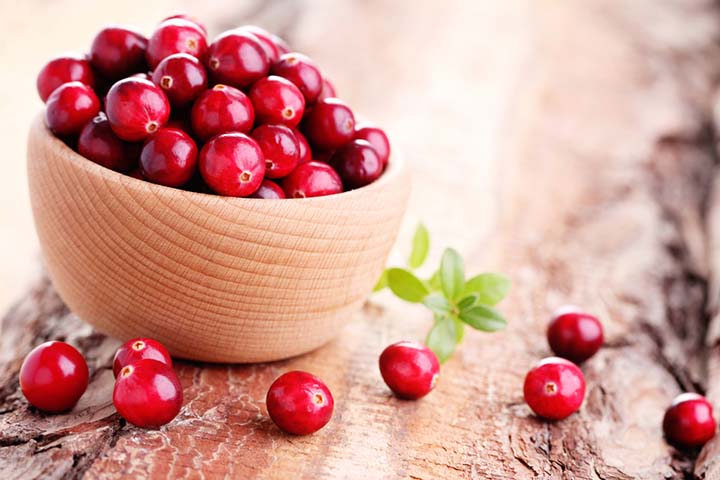Most mothers enjoy drinking cranberry juice when breastfeeding. Cranberry juice is a delicious, tart-sweet drink often used to make mixed drinks. It has several nutrients and health-promoting compounds. However, it has no specific lactation-related uses.
If you too love drinking cranberry juice, knowing about its safety for nursing mothers and their babies is vital to avert any health issues. Scroll down to read more about cranberry juice’s possible health benefits and side effects for lactating women.
Is It Safe To Consume Cranberry Juice When Breastfeeding?
According to the US National Center for Complementary and Integrative Health (NCCIH), consuming cranberry juice is said to be safe (1). However, its consumption in large amounts can cause gastrointestinal issues and, over time, may increase the risk of kidney stones.
The use of cranberry juice for therapeutic purposes needs caution since its safety and efficacy for breastfeeding mothers and their babies is not established.
100% cranberry juice is too acidic and unpalatable, even with added sweeteners. Commercial cranberry juice is often prepared with real cranberry juice or concentrate mixed with water, sweeteners, and ascorbic acidiXNatural or synthetic vitamin C found in certain fruits and vegetables and available as supplements, to produce a clear, bright red liquid (2).
Therefore, the amount of intake per day is crucial as added sweeteners, such as high fructose corn syrup, in cranberry juice are a source of extra calories.
Nutritional Value Of Cranberry Juice
Cranberry juice is rich in bioactive chemicals and several essential elements. The following is a list of nutrients that 100 grams of unsweetened cranberry juice can help you consume to meet your needs while you are pregnant (3).
| NUTRIENTS | AMOUNT |
|---|---|
| Water | 87.1g |
| Energy | 46kcal |
| Protein | 0.39g |
| Total lipid (fat) | 0.13g |
| Ash | 0.15g |
| Carbohydrate, by difference | 12.2g |
| Fiber, total dietary | 0.1g |
| Sugars, total including NLEA | 12.1g |
| Calcium, Ca | 8mg |
| Iron, Fe | 0.25mg |
| Magnesium, Mg | 6mg |
| Phosphorus, P | 13mg |
| Potassium, K | 77mg |
| Sodium, Na | 2mg |
| Zinc, Zn | 0.1mg |
| Copper, Cu | 0.055mg |
| Selenium, Se | 0.1µg |
| Vitamin C, total ascorbic acid | 9.3mg |
| Riboflavin | 0.018mg |
| Niacin | 0.091mg |
| Vitamin B6 | 0.052mg |
| Folate, total | 1µg |
| Folate, food | 1µg |
| Folate, DFE | 1µg |
| Choline, total | 3.3mg |
| Vitamin A, RAE | 2µg |
| Carotene, beta | 27µg |
| Vitamin A, IU | 45IU |
| Lutein + zeaxanthin | 68µg |
| Vitamin E (alpha-tocopherol) | 1.2mg |
| Vitamin K (phylloquinone) | 5.1µg |
| Fatty acids, total saturated | 0.01g |
Source: United States Department of Agriculture
Potential Benefits Of Cranberry Juice
Unsweetened cranberry juice contains vitamins C, E, K, copper (3), and bioactive compoundsiXNatural components found in both plants, animals, and microbes that have therapeutic properties such as polyphenols, tannins, flavonoids (quercetin), phenols, and anthocyaninsiXPigments found in plant-based foods that help in various body functions and possess therapeutic properties(4).
Here are some health benefits of regular consumption of unsweetened cranberry juice.
- Provides important nutrients: Cranberry juice has a considerable amount of micronutrients with several active phytochemicalsiX Naturally occurring compounds in plants that help prevent diseases and promote good healththat are beneficial for the health of the nursing mother as well as her baby.
- Combats free radical damage: Apart from containing vitamins C and E, cranberry juice contains antioxidants that can mitigate free radical damage (5). It helps reduce oxidative stress.
- Used to prevent UTIs: A cocktail drink with 25% cranberry juice (approximately) has been used traditionally to prevent urinary tract infections (UTIs) (6). Numerous studies support this preventive diuretic function of cranberry juice. However, its role in treating the condition is inconclusive (7).
- Could improve gut health: Cranberry juice contains the compounds proanthocyanidinsiXCompounds found in several plants that are known for their antioxidant properties , flavonolsiXBioactive compounds found in fruits and vegetables known to confer a wide range of health benefits, and hydroxycinnamic acidsiXChemicals known to possess antioxidant and antimicrobial properties, found in certain fruits, vegetables, and grains (8). Clinical studies on digestive system health show that these cranberry juice compounds could inhibit the colonization of pylori in the stomach and provide protection against intestinal inflammation.
Regularly drinking unsweetened cranberry juice with pulp may positively impact the heart and oral health. Cranberry juice is known to have antimicrobial and antibacterial properties that can help combat infections. In addition, it has several nutrients, including vitamin C, that can help strengthen immunity. Furthermore, it has several electrolytes that can help maintain proper hydration levels in the body.
Possible Side Effects of Cranberry Juice
Cranberry juice, when consumed as a part of a healthy diet, is well-tolerated. However, there are some general side effects of cranberry juice that must be noted while breastfeeding, too.
- Weight issues: Postpartum weight loss needs a well-balanced diet that should contain whole fruits instead of fruit juices, especially the packaged juices. Since unsweetened cranberry juice can be difficult to consume, most packaged cranberry juices contain added sugars. Consuming excess cranberry juice can increase your calorie intake, thus interfering with your efforts to lose postpartum weight.
- Gastrointestinal issues: Excessive consumption of cranberry juice can upset your stomach.
- Kidney stones: Overconsumption of cranberry juice, over a period, poses a risk of causing kidney stones in susceptible individuals.
- Drug interaction: Clinical studies indicate that there could be possible interactions between cranberry juice and the anticoagulantiXA substance or drug that prevents the clotting of blood and reduces the risk of heart attacks and strokeswarfarin (9) (10). Therefore, mothers who consume any medication should consult a doctor before consuming cranberry juice.
- Possible allergies: Mothers should avoid cranberry if they are allergic to other berries from the Vaccinium genus, such as huckleberry, blueberry, cowberry, and bilberry. If your baby has a suspected allergy to the maternal consumption of these berries, then you must avoid cranberry.
Precautions To Take While Consuming Cranberry Juice
Here are a few precautions you may take while drinking cranberry juice.
- Choose your packaged juice. Read the nutrition label while making a purchase. Cranberry juice cocktail (or cocktail drink) is different from real cranberry juice. Juice that is labeled as “made with 100% real juice” and has added natural sweeteners, such as apple juice, may be preferred.
- If you plan to prepare cranberry juice at home, then follow the safety and hygiene guidelines to mitigate bacterial contamination. Also, try to retain as much pulp as possible since it can provide you with dietary fiber.
- Watch the type and quantity of sweetener that you are adding while preparing the juice at home. High amounts of added sugar may jeopardize your efforts to manage postpartum weight.
- Mothers with type-2 diabetes should discuss the safe intake limit of cranberry juice with a nutritionist.
- Prefer whole fruits to juices. Raw cranberry generally has an extremely tart taste. Thus, use it as an added flavor in soups, salads, and other preparations.
- Avoid using cranberry products, such as dietary supplements or extracts, unless directed by your doctor. These products may have other ingredients that may pass into the breast milk and affect your infant.
Cranberry juice can be a good choice when consumed as a part of a well-balanced diet. You may consume the juice or use it to prepare some delectable recipes. However, its use for therapeutic purposes in the form of cranberry capsules, tonics, or herbal remedies during the lactation phase must be discussed with a healthcare professional. You must also not use cranberry juice as a natural remedy for detoxification purposes without consulting a certified nutritionist or healthcare professional.
Key Pointers
- According to the US National Center for Complementary and Integrative Health, lactating mothers can safely consume cranberry juice.
- Unsweetened cranberry juice contains vitamins C, E, and K, copper, and beneficial compounds such as tannins, phenols, and anthocyanins.
- Cranberry juice offers potential health benefits like boosting nutrition, preventing oxidative stress, and promoting gut health.
- Side effects of consuming the juice may include weight issues, digestive problems, kidney stones, drug interactions, and potential allergies.
- To ensure safe consumption, lactating mothers should choose a reputable brand, practice hygiene when making juice at home, and consult a doctor if taking medication.













